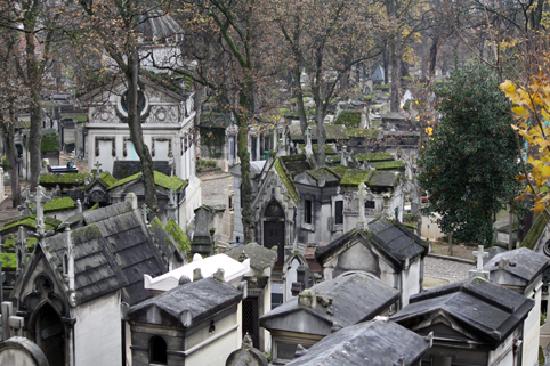(from a discussion thread on MyDeathSpace.com)
" 'Dead Profiles' Create Vast Virtual Cemetery"
(headline on Huffington Post's "Religion" page)
George Carlin's Hippy Dippy Newscaster once reported the rise of a new religion which taught that upon death the soul resides in a parking garage in Buffalo, NY. As plausible a suggestion, I'd say, as the Pearly Gates, the Elysian Fields, the Garden of Allah (not the motel, the other place), Sheol, the Underworld, Hades, the Inferno, Paradiso, Nirvana, or absorption into the Universal Mind.
But the afterlife (or Afterlife, if you prefer) always presumed that the party of the first part was once an actual person who, by virtue of having paid Nature's debt, so to speak, now merited the benisons and usufructs of oblivion, or possibly choirs of angels singing hosannas, a gaggle of celestial virgins, or in whatever fashion one's particular faith suggested one's time might be better spent. The afterlife, if we had to choose one, would pretty much resemble the best parts of the life we had, only with better stuff. (For example, I'll only fish with a handbuilt #5 cane flyrod and a $900 Hardy reel.)
Now I discover that there is a universe of meta-souls with a kind of second-order immortality, an invisible empire of the dead shrieking across the vast reaches of cyberspace. It's enough to drive a person to Mormonism. And just as in the world there is generally a corpus delicti requiring Last Rites and some sort of final disposal, so in the realm of electrons there is a presence of some sort requiring the same attentions. In both instances, death presents opportunity for enterprise, a new wrinkle in what is termed the "bereavement industry," further scope for capitalist endeavor, a new calling, an added revenue stream.
"It's easy to track who joins a social network, but it's hard to keep up with who dies," the HuffPost article notes. "Some accounts exist in perpetuity. Others are shut down by friends and family . . . or by social media companies because of inactivity . . . . One unique site, MyDeathSpace.com, tracks social media profiles of the dead and maintains an extensive message board and Facebook page, where the morbidly curious can discuss the passings. The site, which has archives of 17,825 profiles of the dead, gets up to 11,000 views per day.
Old-style Facebook pages
"By the end of this year, 3 million Facebook users' pages will have become memorial sites for their owners, according to calculations by Nate Lustig, the founder of Entrustet, an online company that helps people access and delete online accounts after someone dies." Facebook, that most ecumenical and demotic of religious communities, and with all the discreet manners of an ordinary mortician, removes such page amenities as requests to friend the deceased, lists of suggested names the deceased friend might know, and doubtless the message function as well - for much the same reason as there are, say, no garages or telephones in cemeteries.
In 1919, lacking both Facebook and foresight, myopic before the advent of MySpace, A.E. Housman ("The Immortal Part") wondered, "When shall this slough of sense be cast/ This dust of thoughts be laid at last/ The man of flesh and soul be slain/ And the man of bone remain?" How could he have known that there'd more than old bones to tidy up after.
"It was on his Facebook page."
Should some 21st century Hamlet wonder whether it might not be nobler in the mind to take arms against a sea of trouble and by opposing end them, a "friend" would surely text him: not so fast bustr - 2FB or not 2FB?




No comments:
Post a Comment